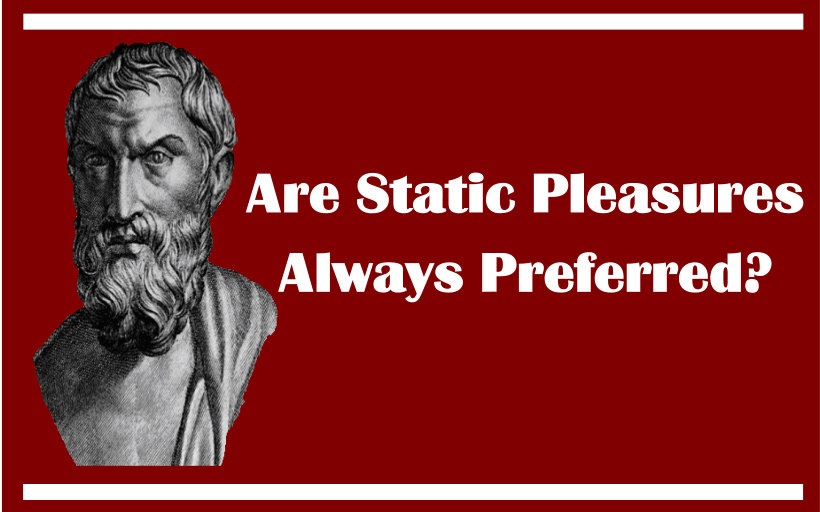Are “Static” Pleasures Always Preferred?
Are static pleasures (call them katastematic, abiding, or whatever term you prefer) always to be preferred over active pleasures? I believe Epicurus would say – and did say – “Certainly Not.” Here are two scenarios that illustrate the point:
1. Suppose you are an ancient Athenian enrolled in the army, and you enjoy both contemplation and your work as a soldier. Today, however, the Persians are on the march toward Greece. They are about to advance to the point where they can no longer be stopped, and your world will be destroyed if you do not march out today with your army to confront them. Would it be appropriate for you to choose to devote today to contemplation?
2. Suppose you are a young adult with a family and you really enjoy philosophy. You are employed as a computer programming, and you enjoy that too, but you really like simply studying philosophy alone in your bedroom best. Would it be appropriate for you to quit your job and devote all your time to studying philosophy?
The answers to both questions should be self-evident. If you wish to maximize pleasure in your life, you must continue to live. It does not matter if you find contemplation or philosophy more pleasurable on a moment-by-moment basis – there are times when reality demands action in order to sustain your life. The purpose of these examples is to show that this choice does not necessarily entail choosing a pain over a pleasure, as in the example given in texts such as “On Ends.” The same considerations apply to choosing a pleasure which we generally find less pleasurable over one that is more pleasurable. There is nothing in “static pleasure” that makes it always and in every case intrinsically to be chosen over an “active pleasure,” nor is there anything inherent in “katastematic pleasure” that makes it more desirable than “active pleasure,” which is defined in Epicurean terms as “joy and delight” in Diogenes Laertius.
As Epicurus said:
PD8. No pleasure is a bad thing in itself, but the things which produce certain pleasures entail disturbances many times greater than the pleasures themselves.” Even katastematic pleasure can entail disturbances many times greater than the pleasure itself, if engaged in under the wrong circumstances.
PD10. If the things that produce the pleasures of profligate men really freed them from fears of the mind concerning celestial and atmospheric phenomena, the fear of death, and the fear of pain; if, further, they taught them to limit their desires, we should never have any fault to find with such persons, for they would then be filled with pleasures from every source and would never have pain of body or mind, which is what is bad.” Even the pleasures which some people look down on as “profligate” would be chosen over katastematic pleasure if they in fact led to happiness.
PD21. He who understands the limits of life knows that it is easy to obtain that which removes the pain of want and makes the whole of life complete and perfect. Thus he has no longer any need of things which involve struggle. The example of the soldier is an example of a time when a choice that involves struggle is necessary. Does that observation invalidate PD21 and mean Epicurus was in error? No, and the reason is that a doctrine like this must be read in context with the full picture of Epicurean philosophy. The full picture is absolutely clear: the goal is to obtain “that which removes the pain of want and makes the whole of life complete and perfect.” This overall goal must always be kept in mind, and any perceived inconsistency here is an artifact of taking this statement out of that context. In fact, Epicurus states this point in the very next doctrine: PD22, “We must consider both the ultimate end and all clear sensory evidence, to which we refer our opinions; for otherwise everything will be full of uncertainty and confusion.”
VS41. “At one and the same time we must philosophize, laugh, and manage our household and other business, while never ceasing to proclaim the words of true philosophy.” We should pursue both static and active pleasures according to when circumstances make each one appropriate.
It seems to me that setting up katastematic pleasure as always to be preferred is a variant of the Stoic error of setting up a means “virtue” as an end in itself. Pleasure is pleasure, and ranking certain activities or experiences as “active” or “passive” can be useful just as it is useful to divide the desires into categories of natural and unnatural or necessary and unnecessary. But the act of ranking pleasures and activities is not an end in itself. The goal of life is maximized pleasure and minimized pain, and that ultimate goal controls every aspect of the calculations of pleasure.
In closing, here are two sayings that make this big-picture analysis very clear:
VS63. “There is also a limit in simple living, and he who fails to understand this falls into an error as great as that of the man who gives way to extravagance.”
VS 71. Question each of your desires: “What will happen to me if that which this desire seeks is achieved, and what if it is not?”
———-
Addendum: Additional references-
PD25. If you do not on every occasion refer each of your actions to the ultimate end prescribed by nature [happy living], but instead of this in the act of choice or avoidance turn to some other end, your actions will not be consistent with your theories.

